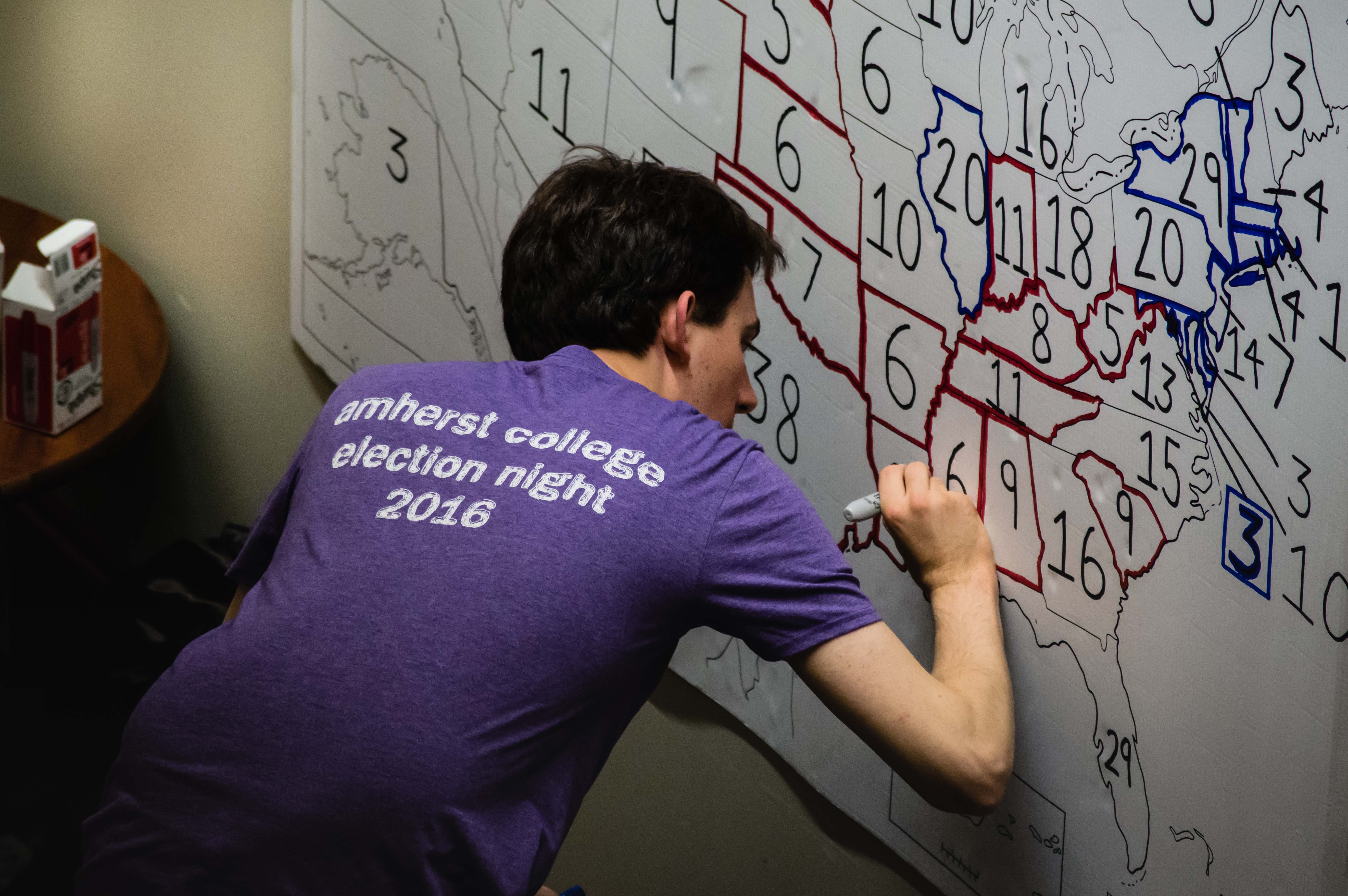

Following a contentious presidential campaign season, Donald Trump’s victory on Nov. 8 was met with a wide range of reactions at the college, ranging from disbelief and fear to celebration.
Students gathered at Keefe Campus Center the evening of Nov. 8 to participate in various election-themed activities and watch coverage of elections results. The event included presidential trivia contests, talks by various faculty members and a discussion of the election led by members of the Amherst Political Union, which co-sponsored the event along with the Association of Amherst Students, Amherst College Democrats and Department of Political Science.
“Our goal was to provide a comfortable space in which students of all political ideologies could be together for this transformative moment in American politics,” said Liam Fine ’17, co-president of the APU. “On a night like election night, regardless of the outcome, there is always a benefit to unity and dialogue.”
Members of the administration and faculty also helped organize the event. Director of the Multicultural Resource Center Bulaong Ramiz, recalling her own experience as a first-year college student during the 2008 presidential election, said in an email interview that “it was an amazing experience to be in community, especially during such a historic election.”
“Regardless of the outcome I thought it would be important to provide space for students to watch the results and process together,” said Ramiz.
The event was widely attended, with several hundred students occupying various spaces in Keefe. Rogelio Oliva ’19, one of the students in attendance, stated that it was his first time voting in a presidential election.
“Any election is going to be significant,” he said. “It has the ability to set the course for the country.” But he noted that this election is particularly important because “people are angry. That’s why it matters.”
As election night continued, it became more and more apparent that Republican candidate Donald Trump would secure the necessary 270 electoral college votes, despite widespread polling predictions that Democratic candidate Hillary Clinton would win.
In the days that followed, the college administration encouraged campus-wide dialogue on the topic of the election. On Nov. 9, President Biddy Martin called for students to join her in Johnson Chapel for a discussion on the significance of community and friendship in light of election results. The Powerhouse and Keefe Campus Center were also opened as a space for conversation and reflection.
Student response to the outcome of the election has varied.
Some, such as Marvin Bell ’19E, Janelle Benjamin ’20, Avery Farmer ’20, Mia Nicholson ’20, Joey Ramesar ’20 and Zan Rozen ’20, held a protest on Nov. 12 at the Homecoming football game between Amherst and Williams. Protesters kneeled during the national anthem to show their objection to “Trumpism,” which Nicholson defined as the “license” granted to white Americans “to find pride in their prejudices against everyone else.”
According to Benjamin, the group chose to protest during Homecoming festivities because the event provided a visible setting for their demonstration. “Most of the school [was] present ... Also, there [was] a lot of alumni there,” said Benjamin. “So I think it’s a way to get the word out effectively.”
“A passive response is a privilege, and I think we should take any opportunity we have to respond,” added Nicholson. “So I think, as a group, we decided that we weren’t going to allow the school to provide a space where everyone could move on and move into celebration without fully and wholly acknowledging that an event happened that will have catastrophic effects for millions of people.”
Faculty and members of the administration have also addressed the impact of a Trump presidency on campus. Ramiz said the MRC’s main priority is “to affirm and support historically and presently marginalized identities.”
“I imagine the MRC will be sought out to to do more programming, provide more conversations and assist students in processing through the reality of this election,” said Ramiz.
“The MRC also seeks to interrogate inequity in our country and to call people into a process of exploring our socialization, our roles as allies and how we can create a community that is truly for all of us,” she adds. “We need these programs and conversations now more than ever.”